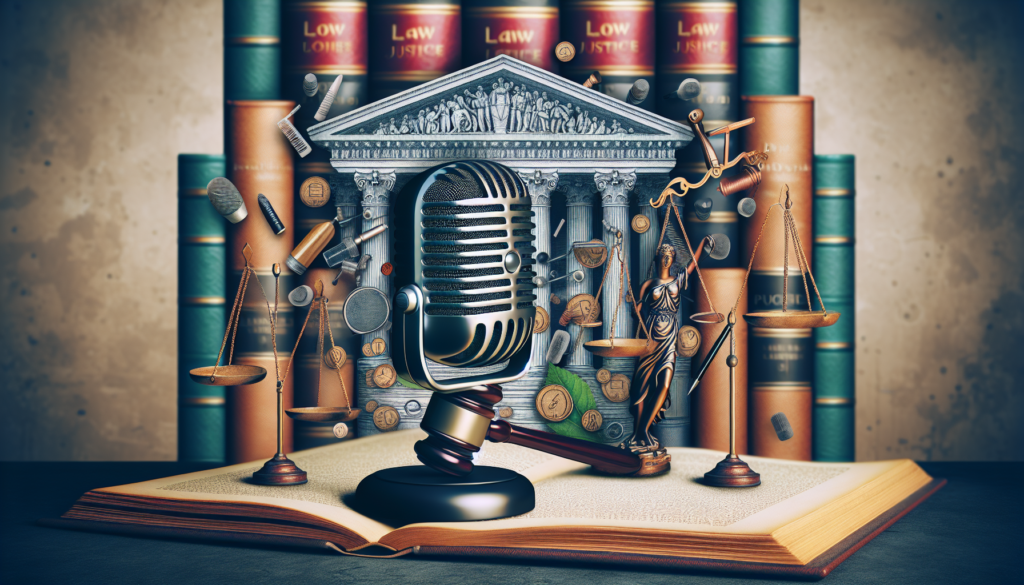If you’re a podcast enthusiast or considering starting your own podcast, it’s crucial to have a clear understanding of the legal aspects involved. From copyright issues to licensing agreements, navigating the legal landscape can be a daunting task. However, with the right knowledge and preparation, you can ensure that your podcast remains compliant and avoid any potential legal pitfalls. In this article, we will explore the key legal considerations every podcaster should be aware of, helping you create content that is both engaging and legally sound. So, grab your microphone and get ready to delve into the legal intricacies of podcasting.

Understanding Intellectual Property Law in Podcasting
Podcasting has become an increasingly popular medium for individuals and businesses alike to share their thoughts, ideas, and stories with a global audience. However, it’s important to understand the legal aspects surrounding podcasting, particularly when it comes to intellectual property law. Intellectual property refers to the legal rights and protections over creations of the mind, such as inventions, artistic works, and designs. In the context of podcasting, intellectual property law primarily encompasses copyright law, which protects original works of authorship, and trademark law, which protects names, logos, and other distinctive branding elements.
The basics of copyright law
Copyright law grants the creator of an original work exclusive rights to its use and distribution. In the context of podcasting, copyright protection applies to the content you create and publish, such as your episodes, scripts, and show notes. As the podcast creator, you automatically hold the copyright to your work as soon as it is fixed in a tangible form, such as a recording or a written transcript. However, to further protect your rights, it is advisable to register your copyright with the appropriate copyright office in your country.
Understanding fair use
Fair use is an exception to copyright law that allows limited use of copyrighted material without permission from the copyright owner. This exception is often invoked for purposes such as commentary, criticism, news reporting, or education. However, what constitutes fair use can be subjective and varies depending on factors such as the nature of the copyrighted work, the amount used, and the effect on the market for the original work. As a podcaster, it’s crucial to understand the principles of fair use and seek legal advice if you have doubts about whether your use of copyrighted material qualifies as fair use.
Dealing with music rights in podcasts
Music can greatly enhance the listening experience of a podcast, but using copyrighted music in your episodes without proper authorization is a violation of copyright law. To legally use copyrighted music in your podcast, you generally need to obtain a license from the copyright owner or a music licensing organization. There are different types of licenses available, such as synchronization licenses for using music alongside your podcast episodes or public performance licenses for playing music during your podcast. It’s important to research and understand the specific requirements and restrictions associated with each type of license to avoid potential legal issues.
Permissions and licensing content for podcasting
In addition to music, you may also need to obtain permissions and licenses for other types of content used in your podcast, such as quotes from books, excerpts from articles, or clips from movies. These materials are protected by copyright, and using them without permission can lead to copyright infringement claims. To avoid legal trouble, it is advisable to seek permission from the copyright owner or consider using content that is in the public domain or licensed under Creative Commons.
Identifying and Avoiding Defamation
Defamation refers to the act of making false statements about someone that harm their reputation. As a podcaster, it’s essential to be aware of defamation laws and take steps to avoid making defamatory statements on your show.
Understanding defamation laws
Defamation laws vary from country to country, but they generally require a false statement of fact that is published (which includes podcast episodes) and causes harm to someone’s reputation. It’s important to exercise caution when discussing individuals or organizations on your podcast, as making false statements or spreading rumors can potentially lead to defamation claims.
Distinguishing opinion from defamation
It’s important to understand the difference between expressing your personal opinion and making a defamatory statement. Opinions are typically protected by free speech rights and are subjective expressions of belief or judgment. On the other hand, making false statements of fact about someone that harm their reputation can be considered defamatory. When discussing individuals or sharing information about them, it’s crucial to distinguish between your opinions and statements of fact to minimize the risk of defamation claims.
Protecting your podcast from defamation claims
To protect your podcast from defamation claims, it’s advisable to conduct thorough research and fact-checking before discussing individuals or presenting information about them. Avoid spreading rumors or making unsupported claims. If you receive a letter or notice alleging defamation, it’s important to seek legal advice and respond appropriately. Retracting or correcting any false statements can help mitigate the potential harm and legal consequences.

Navigating Advertising and Sponsorship Regulations
Advertising and sponsorships can be a valuable source of revenue for podcasters, but it’s important to understand and comply with the regulations set by the Federal Trade Commission (FTC) to ensure transparency and fairness to your listeners.
FTC guidelines for podcast advertising
The FTC has guidelines in place to protect consumers from deceptive advertising practices. These guidelines require podcasters to clearly disclose any material connections, such as sponsorships or paid promotions, that may influence the content of their episodes. It’s important to disclose these relationships in a clear and conspicuous manner that is easily understandable to your audience.
Identifying paid promotions and sponsorships
When you enter into a sponsorship or paid promotion arrangement, it’s crucial to clearly identify and disclose these relationships to your listeners. This can be done verbally within the episode or through written disclosures in the show notes or accompanying episode description. Transparency is key to maintaining trust with your audience and complying with FTC guidelines.
Fine print of podcast sponsorship contracts
When entering into sponsorship or advertising contracts, it’s important to thoroughly review and understand the terms and conditions. Pay attention to exclusivity clauses, length of the agreement, payment terms, and any additional obligations or restrictions imposed by the sponsor. It’s advisable to have a legal professional review the contract before signing to ensure that your rights and obligations are protected.
Understanding Privacy Laws in Podcasting
Privacy is an important aspect to consider as a podcaster. Here are some key points to understand about privacy laws and how they apply to podcasting.
Basics of privacy laws
Privacy laws vary from country to country and can encompass various aspects of personal information collection, use, and disclosure. When it comes to podcasting, privacy laws primarily apply to the collection and use of personal information, such as names, contact information, and sensitive data, from guests, interviewees, or listeners. It’s important to familiarize yourself with the privacy laws applicable in your jurisdiction to ensure compliance.
Conducting interviews and obtaining consent
When conducting interviews or featuring guests on your podcast, it’s important to obtain their informed consent. This includes informing them about the purpose of the interview, the potential uses of the recorded content, and any potential risks involved. Ideally, obtaining written consent is recommended to ensure clarity and avoid any disputes later on. If you plan to collect any personal information from your guests, such as email addresses, it’s important to inform them about how their information will be used and stored, and obtain their consent for such purposes.
Recording conversations and privacy implications
Recording conversations without the knowledge and consent of all parties involved can potentially violate privacy laws. Some jurisdictions have laws that require all parties to consent to the recording of their conversations, while others only require the consent of one party. It’s important to familiarize yourself with the applicable laws in your jurisdiction and adhere to them when recording conversations for your podcast. Additionally, it’s good practice to inform your guests or interviewees if you plan to record the conversation and obtain their consent for the recording.

Podcasting and Employment Law
If podcasting is a part of your employment or involves discussions related to your employment, it’s important to be aware of the potential implications and legal considerations. Here are a few key areas to consider:
Exploring off-duty conduct policies
Some employers have off-duty conduct policies that govern employees’ behavior outside of work hours. If your podcast touches on sensitive topics or if you discuss your employment or workplace experiences, it’s important to review any applicable policies and understand any potential restrictions or obligations these policies may impose.
Understanding non-disparagement clauses
If your podcast involves discussions about your current or former employer, it’s important to review any non-disparagement clauses or agreements you may have signed. Non-disparagement clauses typically restrict individuals from making negative or detrimental statements about their employer or workplace. It’s important to understand the scope of these clauses and seek legal advice if you have any concerns about potential conflicts between your podcasting activities and your non-disparagement obligations.
Podcasting as part of employment agreement
If your podcasting activities are explicitly mentioned in your employment agreement, it’s important to review the terms and conditions outlined in the agreement. Pay attention to any intellectual property provisions, confidentiality clauses, or restrictions on outside activities that may impact your podcasting endeavors. It’s advisable to seek legal advice to ensure that your podcasting activities are in compliance with your employment agreement.
Dealing with Takedown Requests
As a podcaster, you may encounter situations where you receive takedown requests for your episodes. Understanding the process and your rights is crucial in effectively handling these requests.
Understanding DMCA takedown notices
A DMCA (Digital Millennium Copyright Act) takedown notice is a legal request to remove copyrighted material from an online platform, such as your podcast episodes. These notices are typically sent by copyright owners or agents. It’s important to understand the requirements and implications of a DMCA takedown notice, as failure to comply with a valid notice can lead to legal consequences.
Handling takedown requests effectively
When you receive a takedown request, it’s important to carefully review the claims made and assess the potential validity of the notice. If you believe the request is valid and your use of the copyrighted material is indeed infringing, it’s advisable to promptly remove the material to avoid potential legal action. However, if you believe the notice is invalid or that your use of the material falls under fair use or another legal exception, it’s important to respond appropriately and potentially seek legal advice.
Counter-Notification process
If you receive a takedown notice and believe it is incorrect or invalid, you have the option to file a counter-notification to dispute the claim. The counter-notification process typically involves providing information that demonstrates your rights to use the copyrighted material, such as fair use or other legal justifications. It’s important to carefully follow the requirements and deadlines associated with the counter-notification process. Seeking legal advice during this process can help ensure that your rights are protected.

Understanding Trademarks in Podcasting
Trademarks play an important role in protecting the branding and identity of your podcast. Here are some key considerations when it comes to trademarks in podcasting.
Trademark basics for podcasting
A trademark is a word, phrase, symbol, or design that identifies and distinguishes the source of goods or services. In the context of podcasting, trademarks can include your podcast name, logo, slogan, or other distinctive elements that distinguish your show from others in the industry. It’s important to understand the basics of trademark law and how it applies to podcasting to protect your brand and avoid infringing on the rights of others.
Choosing a name without infringing on trademarks
Before choosing a name for your podcast, it’s important to conduct thorough research to ensure that your chosen name does not infringe on existing trademarks. This involves searching trademark databases and conducting general online searches to identify any similar or identical marks in the same industry. It’s advisable to consult with a trademark attorney to assess the availability and registrability of your chosen name and to guide you through the trademark registration process if desired.
How to protect your podcast trademark
To protect your podcast trademark, you can consider registering it with the relevant trademark office in your country. Trademark registration provides additional legal protection and benefits, such as nationwide notice of your ownership, the ability to enforce your trademark in court, and the potential to recover damages in case of infringement. Consult with a trademark attorney to navigate the registration process and ensure that your application meets the necessary requirements.
Contracts and Legal Agreements in Podcasting
As a podcaster, entering into contracts and legal agreements is a common practice. Here are some key types of contracts and agreements in podcasting that you may encounter.
Types of contracts in podcasting
Podcasting involves various contractual relationships, such as co-host agreements, guest appearance agreements, sponsorship contracts, and distribution agreements. Co-host agreements outline the rights and responsibilities of each co-host and address issues such as ownership of the podcast, revenue sharing, and dispute resolution. Guest appearance agreements outline the terms of a guest’s participation in your podcast, including consent to record and potential usage of the recorded content. Sponsorship contracts govern the terms of your relationship with sponsors, including advertising obligations, payment terms, and exclusivity agreements. Distribution agreements define the terms and conditions under which your podcast is distributed on various platforms.
Co-Host agreements
Co-host agreements help establish clear expectations and responsibilities for all co-hosts involved in a podcast. These agreements typically cover topics such as intellectual property rights, revenue sharing, content creation and distribution, and dispute resolution mechanisms. It’s important to have a comprehensive co-host agreement in place to mitigate potential conflicts and ensure a smooth operation of your podcast.
Understanding podcast production and distribution agreements
Podcast production and distribution agreements are contracts between podcasters and third-party production or distribution services. These agreements outline the rights and obligations of each party, including ownership of the podcast, licensing rights, revenue sharing, and marketing efforts. It’s crucial to review and negotiate these agreements carefully to protect your rights and ensure that your podcast is produced and distributed in accordance with your preferences and goals.
Legal Considerations of a Podcast Business Model
If you plan to monetize your podcast and turn it into a business, it’s important to understand the legal considerations associated with your chosen business model.
Choosing a legal structure for your podcast business
Selecting the appropriate legal structure for your podcast business is essential to ensure legal compliance and protect your personal assets. The most common legal structures for small podcasting businesses include sole proprietorships, partnerships, limited liability companies (LLCs), and corporations. Each has its own advantages and disadvantages in terms of liability protection, taxation, and administrative requirements. It’s advisable to consult with a business attorney or accountant to determine the most suitable legal structure for your specific needs.
Understanding tax implications of podcasting
Podcasting as a business entails various tax obligations, including income taxes, self-employment taxes, and potentially sales taxes. It’s essential to understand and comply with the tax laws and regulations in your jurisdiction to avoid penalties and legal consequences. Consulting with a tax professional or accountant can help you navigate the intricacies of podcasting-related taxes and ensure proper compliance.
Insurance considerations for podcasters
As a podcaster, it’s important to consider obtaining appropriate insurance coverage to protect yourself and your business from potential liabilities. Insurance options for podcasters may include general liability insurance, professional liability insurance, and media liability insurance. These policies can provide coverage for risks such as defamation claims, copyright infringement, property damage, and bodily injury. It’s advisable to consult with an insurance professional to assess your specific needs and obtain the appropriate coverage for your podcasting activities.
Future of Law in Podcasting
The landscape of podcasting continues to evolve, and so do the legal considerations surrounding the industry. Here are some insights into the anticipated legal changes in podcasting and how podcasters can adapt to the evolving legal landscape.
Anticipated legal changes in podcasting
As podcasting gains more popularity and continues to disrupt traditional media platforms, it is anticipated that legal regulations and requirements specific to podcasting may emerge. This could include regulations related to content moderation, intellectual property rights, advertising practices, and data privacy. Staying informed about industry trends and engaging in discussions with legal professionals can help you anticipate and adapt to potential legal changes in the future.
Staying updated with legal trends
In an ever-changing legal landscape, it’s crucial for podcasters to stay updated with the latest legal trends and developments. This involves regularly following legal news, reading articles and publications, and attending industry conferences or webinars where legal professionals discuss podcasting-related issues. Joining professional organizations or associations dedicated to podcasting can also provide valuable resources and networking opportunities to stay ahead of legal developments.
Adapting to changes in legal landscape of podcasting
As new legal requirements and regulations emerge, podcasters will need to adapt their practices and procedures to ensure compliance. This may involve revising contracts and agreements, updating content moderation policies, implementing stronger data privacy measures, or adjusting advertising practices. It’s important to embrace a proactive approach and seek legal advice whenever necessary to navigate the changing legal landscape effectively.
In conclusion, understanding the legal aspects of podcasting is crucial for podcasters to navigate and thrive in the industry. Intellectual property law, defamation, advertising regulations, privacy laws, employment considerations, takedown requests, trademarks, contracts, business models, and future legal trends are all important areas to consider. By familiarizing yourself with these legal considerations and seeking the appropriate legal advice when needed, you can ensure that your podcasting activities are compliant with the law and protect your rights and interests as a podcaster.
